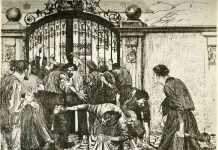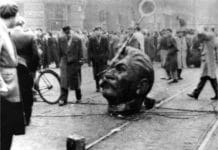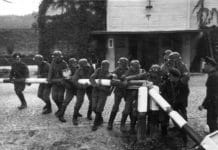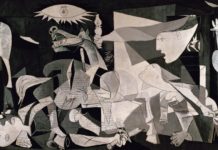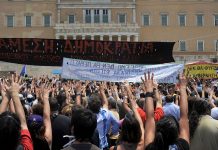Indhold
Det største dybe spadestik til de østeuropæiske stalinistiske systemers begravelse blev taget i Polen fra august 1980.
De polske strejker fra først i juli 1980 imod prisforforhøjelser, får et politisk indhold med besættelsen af skibsværftet i Gdansk, som fører til storstrejker over hele Polen, og til aftalen med regeringen 31.8.1980 om retten til uafhængig organisering for arbejdere og til dannelsen af fagbevægelsen Solidaritet (Solidarnosc).
De polske arbejderes kamptraditoner fra årene forud, – Poznan 1956, Gdansk 1970, Radum 1976 – er inddraget i noget af materialerne.
Men fokus er på peroden før militærkuppet, organisationsforbudet, fængslingerne og den militære undtagelsestilstand fra 13. december 1981.
![August 1980 strike in the Gdańsk Shipyard Lenina. Boards with 21 postulates of the inter-packing strike committee placed on a porterior building at the gate No. 2 of the Gdańsk Shipyard Lenina. Photo: Taken 31 August 1980 by Krzysztof Korczyński. Collection: European Solidarity Center. [This work is free and may be used by anyone for any purpose].](https://socbib.dk/wp-content/uploads/2010/08/Strajk_sierpniowy_w_Stoczni_Gdanskiej_im._Lenina_11.jpg)
Leksikalt/sites
- Solidarnosc (Wikipedia.dk). Kortere dansk intro.
- Solidaritet (Wikipedia.se). Lidt længere svensk.
- Solidarity (Polish trade union) + History of Solidarity (Wikipedia.org)
- The Solidarity Phenomenon (site, online at Internet Archive). Udg. det polske udenrigsministerium, 2005. Indhold bl.a.: Daily Liberty (history of the creation of the “Solidarity” movement) – Words of Liberty – Photogallery – E-cards etc.
- Solidarnosc.dk (site; online på Internet Archive). Med historien, strejken dag for dag, tryksager, personer mv. Udg. af det polske udenrigsministerium i samarbejde med Polen Nu.
- Polen (Leksikon.org). Landeartikel om Polen.
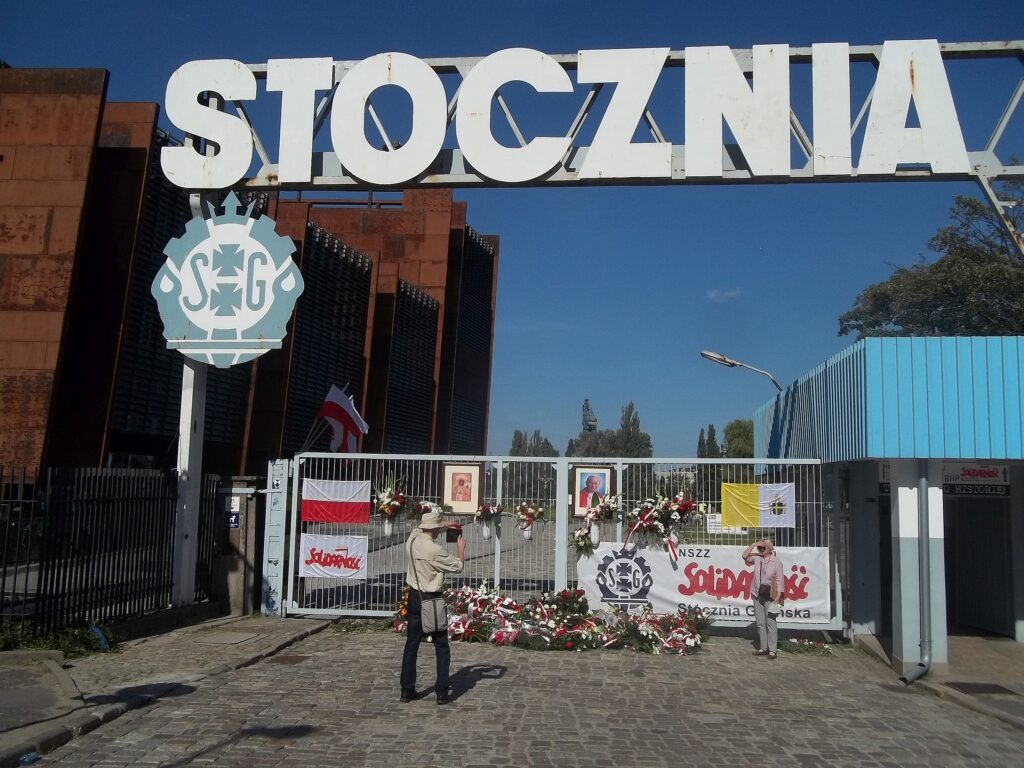
Artikler
Solidarnosc (pdf). Af Kim Fredrichsen (Arbejderhistorie, nr.2, 2021, s.197-198). “Anmeldelse af Roman Smigielski: Komiteen “Støt Solidarnosc”. Oversat af Bent Christensen (Eget Forlag, 2020, 34 s.)
“Et af de ledende medlemmer har nu skrevet sine erindringer om Komiteens virke.”
LO og Solidarnosc 1980-1989: så nær og dog så fjern (pdf). Af Bent Boel (Arbejderhistorie, nr.2, 2007)
Om danske LO’s støtte til Solidarnosc.
Solidarnosc. Af Freddie Nielsen (Socialistisk Arbejderavis, nr.246, september 2005)
“I disse måneder er det 25 år siden, at den uafhængige fagbevægelse Solidarnosc (solidaritet på polsk), skød frem i Polen.”
Solidarity. Part 1-3 (Counterfire, August 29-31, 2020)
“To mark the 40th anniversary of Solidarity in Poland, Jacqueline Mulhallen and William Alderson look at the rise of the movement, its struggle with the regime, and its collapse.”
The triumph and tragedy of Poland’s Solidarity movement. By David Ost (Jacobin, August 24, 2020)
“Poland’s Solidarity trade union was one of the most impressive workers’ movements in postwar Europe. It rocked the foundations of an autocratic regime, but it took a wrong turn as the Eastern Bloc started to crumble.”
See also interview with David Ost: The rise and fall of Poland’s solidarity movement (Ibid., August 9, 2021).
Poland’s Solidarity and its fate. By Tom Junes (Against the Current, Issue 189, July-August 2017)
Review of Jack Bloom, Seeing Through the Eyes of the Polish Revolution: Solidarity and the Struggle against Communism in Poland (Haymarket Books, 2014, 428 p.)
See also review by Andy Zebrowski: Poland’s unfinished revolution (International Socialism, Issue 147, Summer 2015).
Crises and turning points in revolutionary development: emotion, organization and strategy in Solidarnosc, 1980-81. By Colin Barker (Interface, Vol.2, No.1, May 2010, p.79-117; online at Academia.edu). Scroll down.
“This whole paper rests on a controversial assumption, namely that Solidarity in Poland was (at least potentially) a social-revolutionary movement.”
Poland: defeat from the jaws of victory. By Pauk Newbery (Socialism Today, Issue 133, November 2009)
“Arguably, Poland came closest to a successful workers’ revolt against Stalinism in central and eastern Europe. Before 1980, workers’ militancy had developed a well-organised, illegal trade union movement. Then, in that year, Solidarity burst onto the scene in a tidal wave of occupations and strikes which threatened to sweep away the rotten regime.”
25 years after the Gdansk Uprising (Against the Current, No.121, March/April 2006)
Suzi Weissman interviews David Ost: “David Ost is author of The Defeat of Solidarity: Anger and Politics in Post-Communist Europe (Cornell University Press, 2005), and he publishes articles in magazines including The Nation, Dissent, and Tikkun.”
The story of Solidarnosc: fifteen months in 1980-81. By Alan Maass (Socialist Worker, Issue 570, 6 January 2006)
“The 15 months from Solidarity’s founding to martial law are a testament to the power of workers’ action – and to the hope of achieving a better world.”
Solidarnosc Anniversary: A revolution betrayed. By Zbigniew Marcin Kowalewski (International Viewpoint, Issue 370, September 2005)
“The purpose of the noisy ceremonies of the anniversary of the birth of Solidarnosç is to hide its real nature – a workers’ revolution conducted in the name of authentically socialist values.”
The rise and fall of Solidarnosc (Socialism Today, Issue 63, March 2002)
“Rob Jones charts how that movement, which could have overthrown Stalinism and replaced it with a genuine workers democracy, instead opened the door for the restoration of capitalism.”
Poland. Chapter 2, Part 3 in Andy Blunden: Stalinism: Its origins & future, Vol.3 (1993; online at Marxists.org)
Contents: Gdansk and Gdynia 1970 – Radom 1976 – The birth of Solidarity 1980 – How Solidarity defeated Stalinism.
Solidarność: from Gdansk to military repression. By Colin Barker & Kara Weber (International Socialism, Issue 15, Winter 1982, p.5-154)
“[Our] argument may be summed up as follows: first, the Polish workers were defeated because they did not … ‘go far enough’; second, there is no difference in principle between the Polish regime they opposed so inspiringly and the variety of exploiting regimes across the globe, both East and West …”
Solidarity after the coup. By Denis MacShane (Socialist Register, 1982, p.105-124)
“The workers, intellectuals and activists who formed Solidarity did not know how to convert the gains of August 1980 into permanent change. The generals, security officers and party hardliners did not know how to convert the locking up of the Solidarity leaders into a lasting solution of the country’s economic and social problems.”
Understanding the Polish revolt (pdf) (Radical America, Vol.15, No.3, May-June 1981). Interview with Daniel Singer and Marta Petrusewics (p.8-18) + Documents of the struggle (p.19-33).
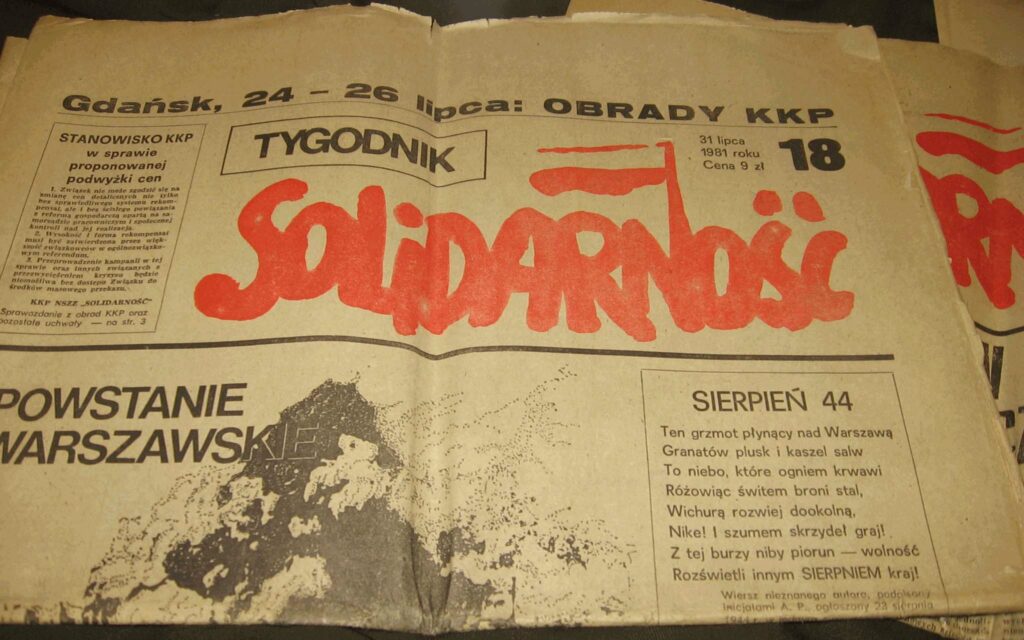
Bøger / pjecer
Solidarnosc: Polen 1980-81. Af Colin Barker (Internationale Socialister, 1991, 55 sider; online på Marxisme.dk) (Revolutioner i vor tid). Chapter in Colin Barker (ed.): Revolutionary Rehearsals (Bookmarks, 1987, p.169-216). Extracts: The rise of Solidarnosc (International Socialism, Issue 108, Autumn 2005, p.52-56)
Danske samtidige:
Polen: De polske arbejderes kamp for frie fagforeninger. Af K. Luboviecki (Socialistisk Øst-Europa Bulletin, 2. oktober 1980, 46 sider)
Den polske sommer: socialistiske perspektiver. Red. af Kennie Katborg og Søren Keldorff (SP-forlag, 1980, 191 sider)
Solidarnosc: Gdansk, august 1980 (Hekla, 1981, 126 sider). Forsidetekst: Solidaritet-bevægelsens egen beretnng i ord og billede – om begivenhederne på Leninværftet der førte til oprettelsen af Solidaritet, den frie fagforening.
Opgør med den autoritære socialisme: Solidaritets planer og forslag til samfundsmæssige og økonomiske reformer. Dokumenter fra Polen 1981. Forord af Kristof Lubowiecki (s.4-19) og Kommentar af Jens Henning Rasmussen (s.104-136) (Kurasje/Politisk Revy, 1982, 136 sider)
Kirken i den polske klassekamp: Beskrivelse og dokumentation. Af Kaj Bollmann, Bodil Jørensen og Ninna Jørgensen (Fk-tryk, 1982, 186 sider)
Læren af Polen. Af Jason Meyler og Ole M. Jensen (VS-tendensen Faglig Fællesliste, 1982, 16 sider)
Magt og afmagt i Polen: til kritikken af den bureaukratiske planøkonomi. Af Bent Gravesen (Aalborg Universitetsforlag, 1984, 434 sider) (Serie om sociale bevægelser, nr. 1)
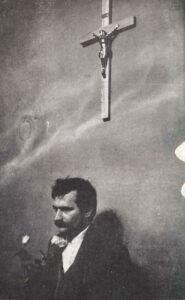
Baggrund:
Klassekampene i Polen: dokumenter fra arbejderopstandene i 1956, 1970-71 og 1976. Redigeret af Tania Ørum og kommenteret af Bohdan Krawchenko og Ebbe Sønderriis (Tiderne Skrifter, 1977, 288 sider)
Arbejderopstanden i Polen 1970-71: fuldstændigt referat af diskussionen mellem Gierek og de strejkende arbejdere på Adolf Warski-værftet i Szczecin 24. januar 1971 (Proletar, nr.4-5, september 1973, 83 sider). Se uddrag på Socialister.dk.
Det største håb: Erindringer fra rejser bag Jerntæppet. Af Anders Laubjerg (ALLGOpress, 2009). Anmeldelser, omtaler mm. på Anders Laubjergs hjemmeside. Bogens kapitel 9 er online på Modkraft.dk: Lenin og korset. Kapitlet omhandler en rejse til Leninværftet i Gdansk i ugen efter Berlinmurens fald.
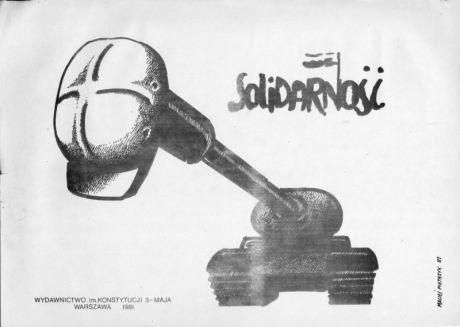
Se også
På Socialistisk Bibliotek:
- Tidslinjen 28. juni 1956 om strejkerne i Poznan.
- Tidslinjen 17. juni 2004 om Jacek Kuron.
- Tidslinjen 10. april 2010 om Anna Walentynowics.
The Polish crisis: Economic factors and constraints. By Domenico Mario Nuti (Socialist Register, 1981, p.104-143)
Poland: Crisis of state capitalism, Part I. By Chris Harman (International Socialism, No.93, November 1976, p.22-29) + Part II (No.94, January 1977, p.26-31)
Chris Harman, 1968 and the historic Open Letter to the Polish Communist Party. By John Rose (International Socialism, Issue 158, Spring 2018, p.167-190)
The tragedy of the Polish Communist Party (1958). By Isaac Deutscher (Socialist Register, 1982, p.125-161)

















